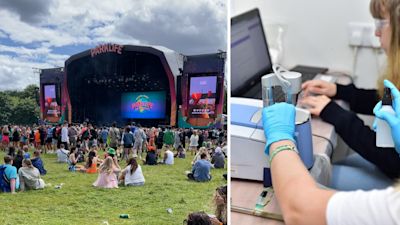Is drug testing going to become a regular part of UK festivals?

By George Hancorn, ITV News' Here's The Story
The first festival season since the end of coronavirus restrictions is well underway - with festivalgoers looking forward to events like Glastonbury opening their gates for the first time since 2019.
While you'd expect to see stages, tents and bands at a festival, something you might not expect is the presence of a drug testing lab.
The Loop, which brings pop-up labs to festivals and other big events, will be at eight UK festivals this summer, in a scheme backed by local police forces.
Its team of chemists examines drugs that have been seized by police or dropped into drug amnesty bins at the festival gates, finding out what drugs are in circulation and whether there are any particularly dangerous ones that warrant sending out an alert on social media.
ITV News visited Parklife Festival in Manchester, where The Loop was attending its first festival of the summer.
After a weekend of testing drugs at the festival, The Loop discovered eight brand new pills in circulation. Among them, was one which was almost twice as strong as the average MDMA pill.
The varying difference of strength between such pills can pose a big risk to people taking them, Professor Fiona Measham, founder of The Loop and Chair in Criminology at Liverpool University ,told ITV News.
"We have pills which are two or three times the strength of an average adult dose.
"If somebody 'double drops' those, they could be taking five or six times the strength of a single dose in one go, and that's where things could go amiss."
"It's an illegal drug market. Nobody knows what's in circulation. So if we know what's in circulation, and there any really strong substances then the medics can respond appropriately."
The pandemic changed the nature of drugs that were in circulation.
Last year, research by Professor Measham and The Loop found 46% of all pills sold as MDMA contained no traces of the drug at all.
This year, that figure fell to 11%.
"We find that over 95% of pills have got MDMA in and we were really surprised last summer to find that 45% didn't have any MDMA in", Fiona explains.
"So it's really noticeable that the market turned upside down. Obviously, people had been in lockdown for 16 months. So when people came out and about again and festivals and nightclubs opened up again, there was a massive new demand for party drugs.
"In the Netherlands [one of the countries where MDMA is exported to the UK], their nightclubs and festivals were still closed and the pill manufacturers were still closed.
"So we think that it was that demand [in the UK] was way outstripping supply."
The Loop harnesses the power of social media to warn people about especially dangerous drugs that are in circulation.
"There's only so many members of the public that we can have a physical conversation with face to face," lab manager Guy Jones told ITV News.
"We have the ability to reach potentially thousands of people by putting out an alert about an unusually dangerous substance.
"And so by having very high quality photographs of that sample, we can be more effective at targeting and making sure people are aware."
After getting approval from the Home Office, The Loop recently set up city centre testing, allowing members of the public to drop off drugs to be tested, with results being returned in about an hour.
Young people we spoke to going to Parklife largely welcomed the ability to learn more about the drugs in circulation - and Fiona hopes that The Loop's drug testing lab will become a regular sight at more festivals in the future.
"I think increasingly it's the case that festivals and events can see the value of this because with a festival like [Parklife], there's 85,000 young people", Professor Measham says.
"It's unrealistic to think that none of them are going to be taking drugs and therefore all of the services on site want to know what's happening, what's in circulation, what people are taking, so it makes sense really.
"It's a very small outlay to pay for a testing service, but at the end of the day it could actually save lives."
For more information:
Here's The Story is a new strand from ITV News bringing you stories worth knowing plus original journalism worth watching from our team of reporters. You can follow Here's The Story across ITV News' social media platforms, including on our Instagram account, or you watch the latest videos here on the ITV News website.